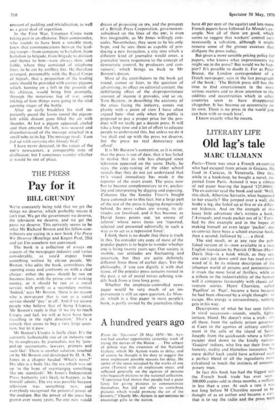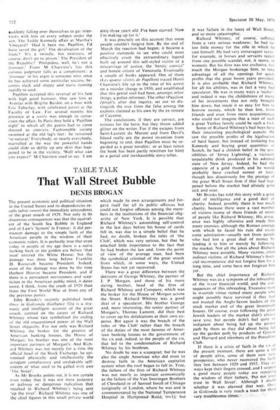LITERARY LIFE
Old lag's tale
MARC ULLMANN
Paris—There was once a French ex-convict who had escaped from prison in Guiana. He lived in Caracas, in Venezuela. One day, while in a bookshop, he bought a novel, im- ported from Paris. Around it was a ribbon of red paper bearing the legend '125,000th'. The ex-convict read the book and said: 'Well, this chick, Albertine Sarrazin, what happened to her exactly? She jumped over a wall, she broke a leg, she holed up at five or six differ- ent hideouts. And on the strength of this lousy little adventure she's written a book, l'Astragale, and made packet out of it.' Forti- fied by this example and in the hopes of making himself an even larger 'packet', our ex-convict hero buys a school exercise book, then a second, followed by ... a third.
The end result, or at any rate the pub- lished version of it—now available in a racy English translation by Patrick O'Brian (Hart- Davis 36s)—is a book which, as they say, one can't put down until one has read every word of it. In its minute description of the inhuman world of prisons and penitentiaries it rivals the most lurid of thrillers, while as a tribute to the indomitability of the human will it compares favourably with classic ad- venture stories. Henri Charriere, called 'Papillon' or 'Papi', became a hero because he had been obsessed by a single thought: to escape. His energy is extraordinary, nothing gets in his way.
Descriptions of what he has seen follow in vivid succession—sounds, smells, fights. torture, blood. He doesn't miss a trick : it's all there, from the sadistic prison governor at Caen to the agonies of solitary confine- ment in the cells of the island of Saint- Joseph; from the quicksands where a fellow escaper died down to the kindly natives. `Guajiro' indians, who live out their lives in honesty, nudity and blameless innocence. No mere skilful hack could have achieved such a perfect blend of all the ingredients most calculated to touch the instincts of contem- porary man.
In fact this book has had the biggest sale the French book trade has ever seen: 300,000 copies sold in three months, a million in less than a year. At such a rate it was not long before M Charriere ceased to be thought of as an author and became a star; that is to say the radio And the press.. were suddenly falling over themselves to get inter- views with him on every subject under the sun. The Teddy Kennedy affair at Martha's Vineyard? 'Had it been me, Papillon, I'd have saved the girl.' The devaluation of the franc? 'It's a swindle, but ministers, of course, don't go to prison.' The President of the Republic? 'Pompidou, well, he's not a frontage.' From M Charriere's lips this curious judgment falls as a compliment: a 'frontage' in his argot is someone who, once he has achieved some particular success, be- comes slack and sloppy and starts running rapidly to seed.
Papillon accepted this reversal of his fate with high good humour. One saw him at Avoriaz with Brigitte Bardot, on a boat with Eric Tabarlay, with celebrated jurists at the Faculty of Law. For several months his presence at a soiree was enough to conse- crate the affair. In Paris they held a 'Papillon night' to which all the gueits had to come dressed as convicts. Fashionable society swooned at the old lag's feet: he remained 'so natural.' Everybody, or nearly everybody, marvelled at the way the powerful hands could slide so deftly up any skirt that hap- pened to be in the vicinity. 'Well what can you expect?' M Charriere used to say. 'I am
sixty-three years old. I've been starved. Now I'm making up for it.'
It was precisely on this account that some people couldn't forgive him. By the end of March the reaction had begun; it became a positive stampede to see who could most effectively crush the extraordinary legend built up around this self-styled victim of a miscarriage of justice, the 'heroic convict' and honest citizen of Venezuela. Eventually a couple of books appeared. One of them (Les quatre verites de Papillon) traced Henri Charriere's life up to the time of his arrest on a murder charge in 1930, and established that this genial soul had been, amongst other things, a police informer. The other (Papillon epingle), after due inquiry, set out to dis- tinguish the true from the false among the exploits claimed as his own by the ex-inmate of Cayenne.
The conclusions, if they are correct, are ruinous for the hero; but they throw added glitter on the writer. For if the escapes from Saint-Laurent du Maroni and from Devil's Island really are the purest invention from beginning to end, then Papillon must be re- garded as a great novelist: or at least (since the book has been partly rewritten for him) as a genial and inexhaustible story-teller.



































 Previous page
Previous page